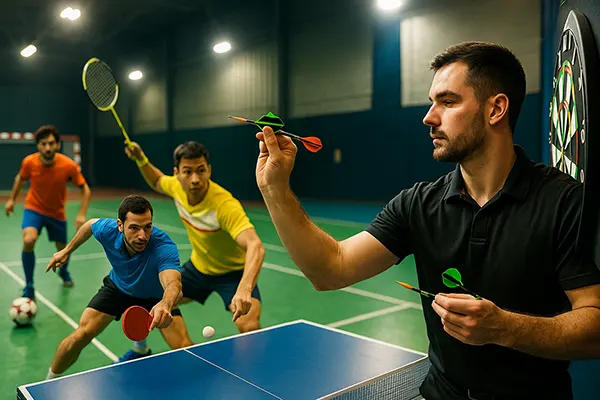When most bettors think about sports wagering, they imagine football, tennis or horse racing. However, a growing number of informed punters are now turning their attention to less mainstream sports that offer valuable odds and higher potential returns. Analysing such markets requires patience, but the rewards often compensate for the effort.
Understanding Niche Sports and Market Gaps
Less popular sports include disciplines such as table tennis, badminton, darts, and even esports titles that are gaining recognition worldwide. Because these events attract fewer bettors, bookmakers tend to offer wider margins or set lines that are easier to exploit. Sharp bettors can take advantage of these gaps through careful research and data monitoring.
For instance, in table tennis, individual player form, match frequency, and surface type can drastically influence results. Unlike major football leagues, where odds quickly reflect every piece of news, niche sports markets often move slower. This creates windows of opportunity for analytical bettors who can interpret performance statistics better than the average punter.
Moreover, regional tournaments in these lesser-known sports often lack comprehensive coverage, which further contributes to pricing inefficiencies. Using independent data sources and understanding player motivation, travel schedules, or fatigue levels can make all the difference in predicting outcomes accurately.
Statistical Approaches to Spotting Value
Analysing historical data is essential for identifying consistent value in niche sports betting. Bettors should build personal databases, recording outcomes, player tendencies, and conditions affecting results. Advanced metrics like win percentages by location or head-to-head records against specific styles can help uncover overlooked opportunities.
Another useful method is applying bankroll management combined with small-stake testing. Since liquidity in these markets can be limited, gradual investment and sample analysis over several months provide clearer insights into profitability. Understanding variance is key; niche sports can be unpredictable, but long-term discipline balances risk and reward.
Finally, using software that tracks odds movement across several bookmakers can indicate where the market is slow to react. When odds drift without valid reasons, informed bettors may step in before adjustments occur. This systematic approach often transforms seemingly random bets into a structured investment strategy.
Hidden Value in Regional and Emerging Disciplines
Sports such as futsal, Gaelic football, or floorball are thriving in specific regions but remain underrepresented globally. The lack of widespread attention often means that bookmakers dedicate less analytical effort to setting precise odds. For bettors with regional expertise, this imbalance becomes a strategic advantage.
Take floorball as an example. The sport is extremely popular in Scandinavian countries but less followed elsewhere. Understanding local leagues, team chemistry, and home advantages can generate far better predictions than relying on general statistics. Similarly, betting on youth-level competitions can be profitable if one follows development leagues closely.
In emerging markets like esports or mixed martial arts at minor promotions, detailed knowledge of competitors and match setups can lead to surprisingly accurate predictions. Since public opinion influences odds less in these environments, experienced bettors can find genuine value through qualitative assessment rather than hype.
Risk Management and Responsible Betting
Despite the attractive potential of high-return markets, risk management must remain a top priority. Smaller sports may experience sudden cancellations, limited statistics, or inconsistent officiating, all of which add uncertainty. Establishing strict limits per wager and adhering to a disciplined staking plan protects the bankroll from volatility.
Responsible gambling also involves emotional control. Because niche markets are less liquid, overbetting can distort personal results and create psychological pressure. Sticking to data-driven analysis instead of chasing quick wins ensures long-term sustainability.
Lastly, diversification matters. Combining bets across multiple sports reduces dependency on a single unpredictable event. A balanced strategy based on thorough research and ethical betting principles will always yield stronger, more stable results than impulsive wagering.

How to Build Expertise in Niche Sports
Gaining proficiency in a less popular sport takes time and consistent effort. Start by following official associations, reading tournament summaries, and joining communities of enthusiasts who share data and tactical insights. Many successful bettors build their edge from passion rather than short-term profit motives.
Analysing video replays, tracking player progress across seasons, and studying coaching trends are all practical ways to improve forecasting accuracy. The deeper your understanding of the sport’s rhythm and structure, the more confidently you can assess potential outcomes.
Collaboration can also help. Networking with local experts or professional tipsters familiar with niche events can shorten the learning curve. Combining collective knowledge with transparent record-keeping enhances decision quality and establishes a reliable framework for steady returns.
Technological Tools for Competitive Advantage
Modern bettors rely heavily on technology. Statistical databases, odds comparison sites, and machine learning tools now allow quick detection of value bets even in obscure markets. These instruments streamline data interpretation and minimise human error in assessing probabilities.
Some bettors integrate API feeds or spreadsheet models that automatically compare bookmaker odds to their calculated fair probabilities. When used ethically, such tools support smarter decision-making and reduce bias. However, it remains crucial to verify every data source for reliability.
Ultimately, technology is a supplement, not a substitute for expertise. Successful bettors combine automated analysis with intuition developed through real experience, creating a balanced and responsible approach to betting on lesser-known sports.




